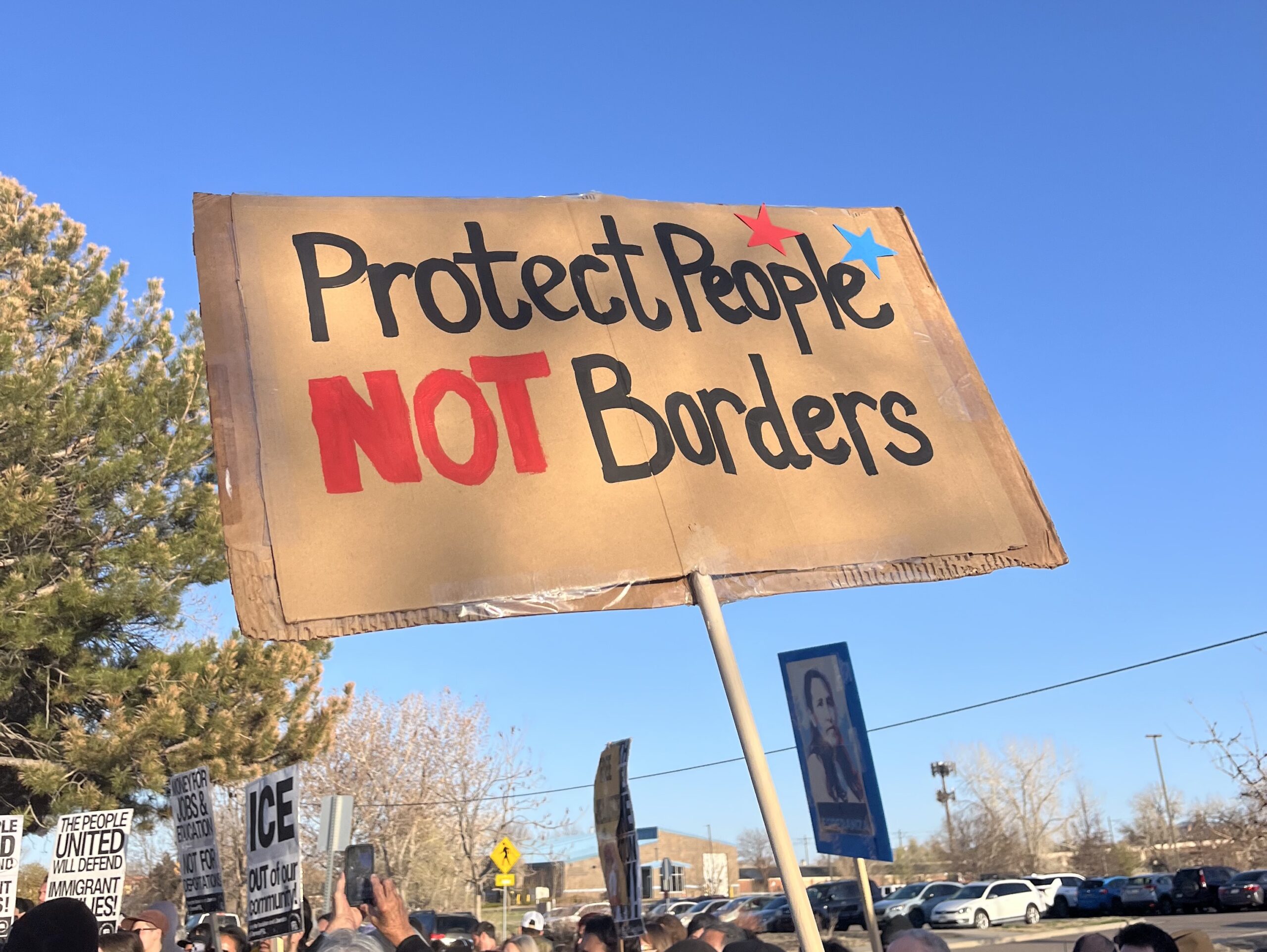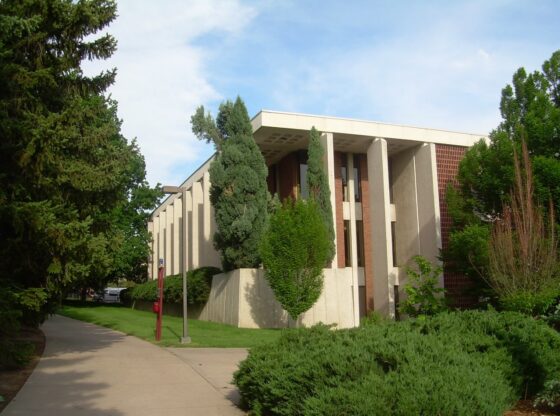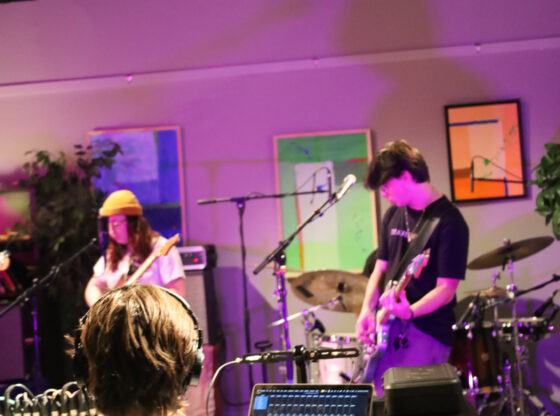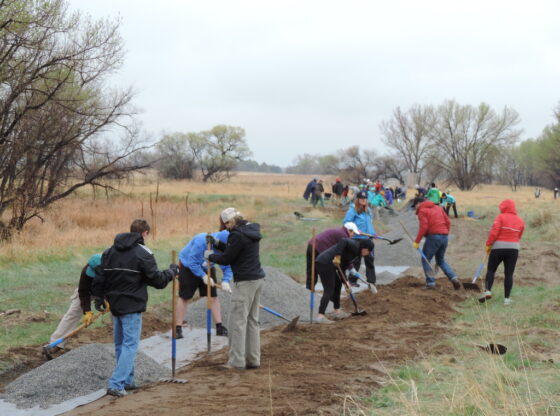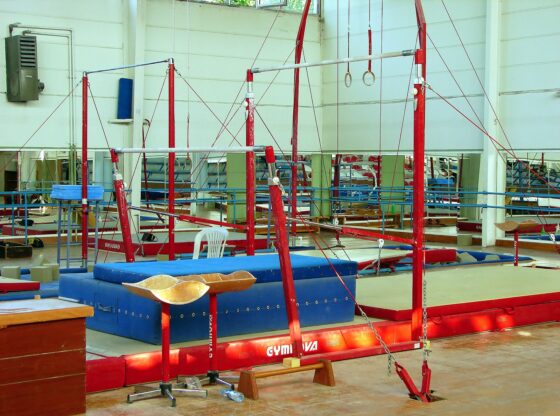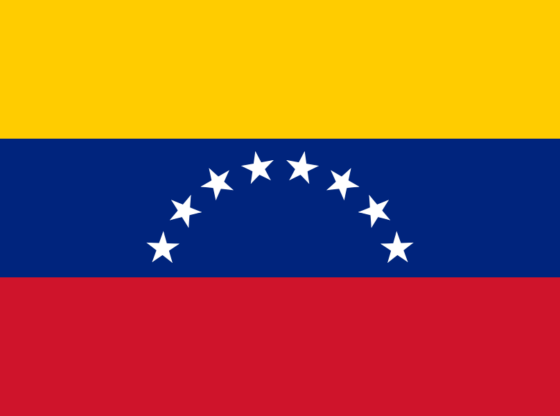Last Monday, a vigil was held outside the Aurora ICE facility where Jeanette Vizguerra, a longtime Colorado resident, mother, grandmother and immigrant rights and labor activist, was detained on March 17 by ICE while working at a Target in the Denver metro area.
The vigil was hosted by the Denver Party for Socialism and Liberation (PSL), but it is just one of many organizations that have volunteered to host the ongoing vigils each Monday to support Vizguerra and her family.
One of Vizguerra’s daughters, Luna, who has been taking time away from her college education to support her mother, was in attendance.
Just outside the facility’s gates, Luna received a call from her mother inside the facility. She held up her phone to the microphone so the crowd could hear and translated her mother’s words from Spanish to English.
“We will keep fighting and keep being resilient, and she hopes that more and more people will show up every Monday, ” said Luna.
Through the phone’s metallic speaker, Vizguerra assured the crowd that she was okay health-wise but that conditions inside the facility had become more difficult, given the rising price of food.
The for-profit prison company that runs the Aurora ICE facility, GEO Group, is supposed to adequately feed its migrant detainees, who are considered civil rather than criminal detainees under federal law. Yet the GEO Group charges detainees for necessities like deodorant, toothpaste, snacks and other commissary goods while simultaneously paying detainees salaries sometimes lower than minimum wage to work inside the facility.
After the phone call ended, representatives of various local immigrant rights organizations spoke. Ernesto Vigil, a published writer, scholar of local contemporary political issues and affiliated faculty at the Korbel School of International Studies, spoke about the history of immigration to the United States.
The crowd then began chanting, “ICE, Escucha! Estamos en la lucha!” which translates to “ICE, Listen! We are in the struggle!” As the volume of the chants rose, a few detainees within the compound began banging on the barred windows, and those on the outside could see the outlines of hands and faces against the hazy yellow glass of the facility’s windows.
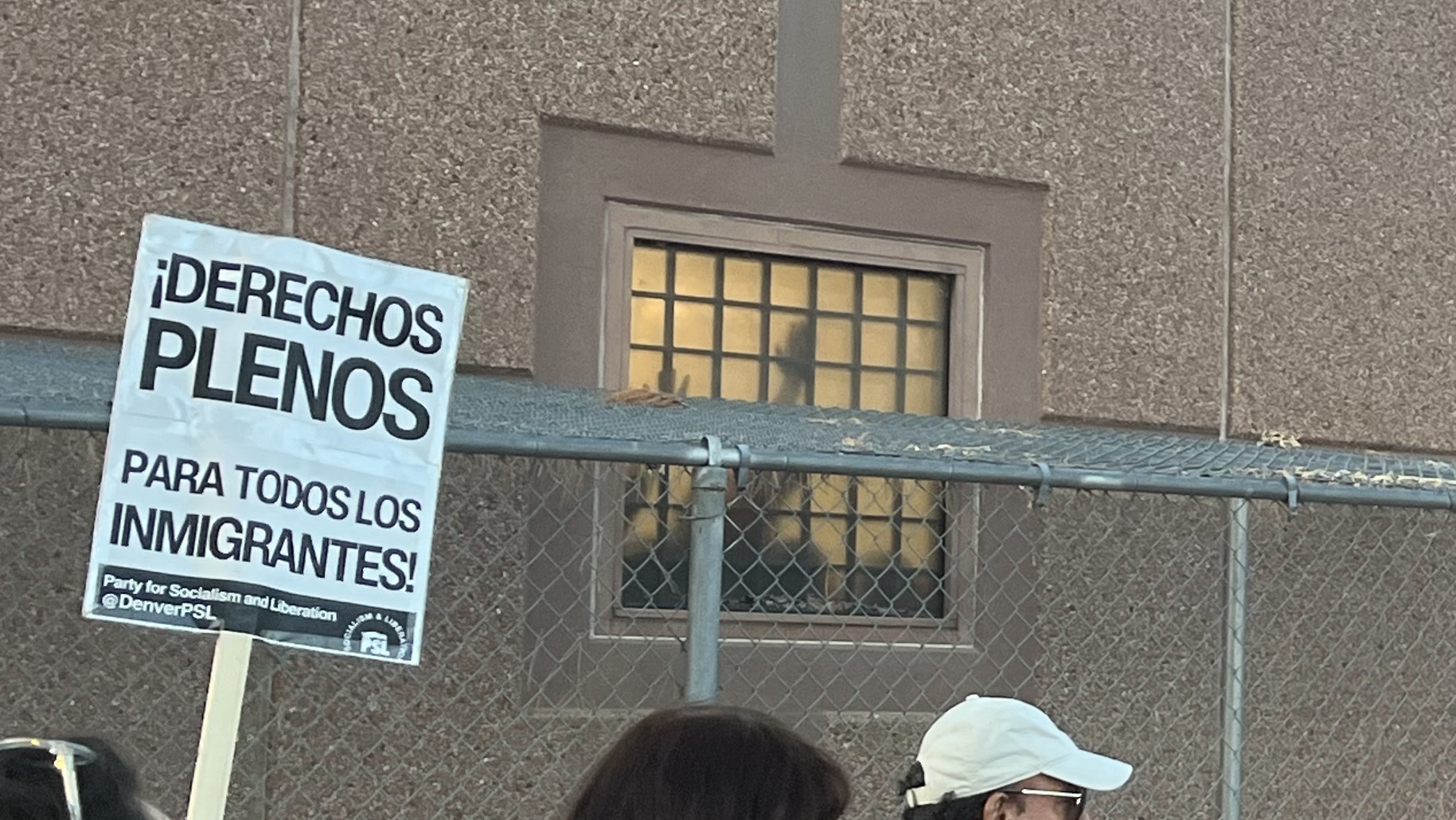
Detainees of the Aurora GEO ICE facility put their hands to the glass
Vizguerra’s legal team, which is being paid for with community donations through a GoFundMe, has argued that her recent detainment is politically motivated, precisely because of her long history as an advocate for immigration reform.
During her time in the U.S., Vizguerra has been a union organizer for the Service Employees International Union (SEIU), has founded several immigrant rights organizations, including the Metro Denver Sanctuary Coalition (MDSC), and was named one of Time Magazine’s “100 Most Influential People” in 2017.
Vizguerra’s history as an advocate and ties to DU
Vizguerra, who entered the country without documentation, gained widespread recognition in 2017 when, after her application to remain in the U.S temporarily was denied, she sheltered in several Colorado churches to avoid being deported under the first Trump administration.
Until 2017, Vizguerra was a relatively low priority for deportation under the Obama administration, which was mainly focusing on removing migrants who were convicted criminals. When Donald Trump came into office in 2017, he did away with those enforcement goals, making every immigrant a target for enforcement, including Vizguerra.
In Feb. 2017, Vizguerra anticipated that ICE authorities would deny her newest application for a stay of deportation, and decided to miss a scheduled “check-in” with ICE and began living in the basement of the First Unitarian Society of Denver.
It was then that Vizguerra began an 86-day-long self-confinement while continuing her work as an activist for immigration reform from within the churches. Many members of the public, including members of the University of Denver community, volunteered to support Vizguerra during this time.
Yessenia Prodero was a graduate student at the Korbel School of International Studies in 2017, and was just one of many DU students who volunteered at the church where Jeanette was staying. In an interview, Prodero told the Clarion how hard Jeanette worked during those days.
“I feel like she was on the phone all the time,” Prodero said.
Prodero’s interactions with the activist leader helped shape her own view of activism and encouraged her to continue her career as an organizer after graduating from Korbel.
“I didn’t even know what an organizer was when I started grad school… I didn’t know what it was to have a sanctuary, it was a huge learning curve around the activism that Jeanette was doing,” said Prodero.
Sanctuary, in immigration terms, refers to “cities and counties that limit their cooperation with federal immigration authorities, like ICE. They do so so that low-threat undocumented immigrants can get protection from deportation,” according to ImmigrationHelp.org.
Colorado, while not being technically a “sanctuary state,” does have a robust immigrant rights community.
Rebecca Galemba, a professor at the Korbel School, and close friend of Vizguerra, says that this strong community should be partly attributed to Vizguerra herself.
“People like Jeanette are one of the reasons the immigrant rights community in Colorado is as strong as it is right now,” wrote Galemba in a statement to the Clarion.
After a few months of Vizguerra’s confinement in 2017, Democratic Senator Michael Bennet and then Rep. Jared Polis introduced a private bill in the U.S. Senate to grant her a path to permanent residency. Although that bill failed, it still led to her receiving another temporary stay of deportation until 2019.
Vizguerra was able to walk free again for two years, but in 2019, after the Polis/Bennet stay of deportation had expired, she was once again forced to shelter at the First Unitarian Society of Denver until President Biden extended her temporary stay again in 2020.
During Vizguerra’s second stay at the First Unitarian Society of Denver in 2019, Diego Bleifuss Prados, a former Korbel School of International Studies master’s student, heard from a friend at DU that groups supporting Vizguerra needed more volunteers.
“The initial purpose of those volunteer shifts was to have someone there to answer the door and provide support in case ICE agents came at night. Over time, it became more about just keeping Jeanette company and helping disrupt the monotony and boredom that comes with being confined,” Prados wrote in a message to the Clarion.
Prados and Prodero’s willingness to volunteer for Vizguerra was inspired by their interactions with Korbel professors like Galemba.
“Looking back, I’m so grateful that’s what I was doing because professors like Rebecca Galemba, with her work on wage theft in Denver, helped me connect research and theory with direct action, while professors like George DeMartino changed how I saw and interpreted the world,” Prados wrote.
Galemba had been involved in the local immigration rights community since before the first Trump administration.
“In 2017, through my collaborations with Denver’s worker center, Centro Humanitario (now Centro de los Trabajadores Colorado), I also became connected with community members organizing around sanctuary initiatives through First Unitarian Church, the American Friends Service Committee (AFSC) and the Denver Metro Sanctuary Coalition, which Jeanette founded,” wrote Galemba.
In 2017, Galemba was also working on a large project examining wage theft and its disproportionate effects on Latino immigrant workers in Denver, which she was able to involve her students in as well.
“Some of the students got involved through either my Qualitative Methods course that collaborated with such initiatives directly, or my wage theft research and advocacy project with immigrant day laborers, and some students deepened their involvement,” wrote Galemba.
“Rebecca was amazing in kind of spearheading that learning for me, Oliver [Kaplan] as well,” said Prodero.
Vizguerra’s impacts on her community extend beyond supporting immigrants and labor unions, although that work is also essential. She has been a guiding figure and often a willing teacher for many students looking to become activists.
“I also want to stress that Jeanette had long been a presence in the DU community; they were not just accompanying her at a difficult time, but her deep experience as an organizer had built critical consciousness and knowledge at DU, where she was often sought out as a role model for many of our students,” wrote Galemba.
Vizguerra’s current detention has alarmed these students who know how important she is to the community.
“Her being in detention now is just a tool to cause more fear in the community,” said Prodero about Vizguerra’s current confinement.
“We as a society are choosing to kidnap and imprison mothers, fathers, children, people, and tearing apart families and communities, in the service of some abstract concept of who belongs in this country. It doesn’t have to be that way,” wrote Prados.


